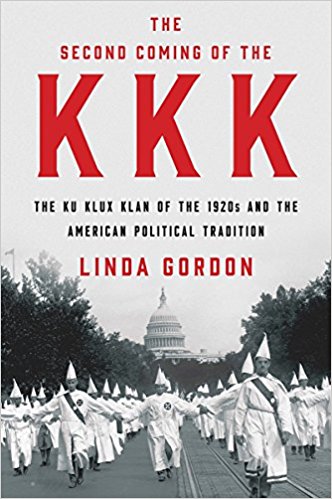 This week at In The Past Lane, the history podcast, I speak with historian Linda Gordon about her new book, The Second Coming of the KKK: The Ku Klux Klan of the 1920s and the American Political Tradition (Liveright, 2018). Most Americans are familiar with the first version of the KKK, the one that was founded in 1866, right after the Civil War, in order to uphold white supremacy in the South through campaigns of terrorist violence. Once the Jim Crow system of racial oppression was in place by the 1890s, the KKK faded away. But a new KKK emerged in 1915, inspired in part by the debut of, “The Birth of A Nation,” a deeply racist film that hailed the KKK as the savior of the white South. As Linda Gordon explains, this KKK was different from the original in that it was national in scope and it expanded its message of hate to target, in addition to African Americans, Jews, Catholics, and immigrants. It also promoted itself as a legitimate patriotic organization and focused its efforts on mobilizing political power. It’s a fascinating conversation and one – in light of Charlottesville and the emergence of the Alt-Right – incredibly relevant to 2018.
This week at In The Past Lane, the history podcast, I speak with historian Linda Gordon about her new book, The Second Coming of the KKK: The Ku Klux Klan of the 1920s and the American Political Tradition (Liveright, 2018). Most Americans are familiar with the first version of the KKK, the one that was founded in 1866, right after the Civil War, in order to uphold white supremacy in the South through campaigns of terrorist violence. Once the Jim Crow system of racial oppression was in place by the 1890s, the KKK faded away. But a new KKK emerged in 1915, inspired in part by the debut of, “The Birth of A Nation,” a deeply racist film that hailed the KKK as the savior of the white South. As Linda Gordon explains, this KKK was different from the original in that it was national in scope and it expanded its message of hate to target, in addition to African Americans, Jews, Catholics, and immigrants. It also promoted itself as a legitimate patriotic organization and focused its efforts on mobilizing political power. It’s a fascinating conversation and one – in light of Charlottesville and the emergence of the Alt-Right – incredibly relevant to 2018.
Among the many things discussed in this episode:
 What was the original Ku Klux Klan that emerged in the wake of the Civil War?
What was the original Ku Klux Klan that emerged in the wake of the Civil War?
Why did a second version of the KKK arise in 1915 and how did it differ from the original?
How the KKK broadened its message of hate to target not only blacks, but also Jews, Catholics, and immigrants.
Why were so many women drawn to the KKK in the 1920s?
How evangelical ministers played a key role in boosting KKK membership to more than 4 million by 1927.
How the KKK in the 1920s presented itself as just another patriotic fraternal society and not a hate group.
How the KKK was a vast business that raked in more than $25 million a year at its peak.
How the climate of intolerance in the 1920s has many similarities with contemporary America.
 Recommended reading:
Recommended reading:
Linda Gordon, The Second Coming of the KKK: The Ku Klux Klan of the 1920s and the American Political Tradition (Liveright, 2018)
Kathleen M. Blee, Women of the Klan: Racism and Gender in the 1920s
Lizabeth Cohen, Making a New Deal: Industrial Workers in Chicago, 1919-1939
Roger Daniels, Guarding the Golden Door: American Immigration Policy and Immigrants since 1882
Felix Harcourt, Ku Klux Kulture: America and the Klan in the 1920s
Kenneth T. Jackson, The Ku Klux Klan in the City 1915-1930
Nathan Miller, New World Coming: The 1920s And The Making Of Modern America
Peter Schrag, Not Fit for Our Society: Immigration and Nativism in America
Related ITPL podcast episodes:
Episode 003 with historian Lisa McGirr about her book on Prohibition
Episode 013 on the history of the Pledge of Allegiance
Music for This Episode
Jay Graham, ITPL Intro (JayGMusic.com)
Kevin McCleod, “Impact Moderato” (Free Music Archive)
Jon Luc Hefferman, “Discovery” (Free Music Archive)
Jon Luc Hefferman, “Winter Trek” (Free Music Archive)
The Bell, “I Am History” (Free Music Archive)
Production Credits
Executive Producer: Lulu Spencer
Associate Producer: Tyler Ferolito
Technical Advisors: Holly Hunt and Jesse Anderson
Podcasting Consultant: Darrell Darnell of Pro Podcast Solutions
Photographer: John Buckingham
Graphic Designer: Maggie Cellucci
Website by: ERI Design
Legal services: Tippecanoe and Tyler Too
Social Media management: The Pony Express
Risk Assessment: Little Big Horn Associates
Growth strategies: 54 40 or Fight
© In The Past Lane, 2018
